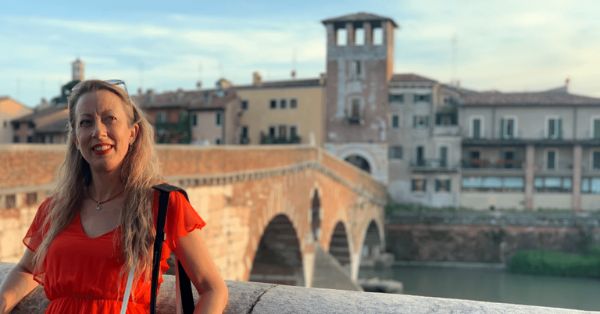Contact Us
Company Registered in Borgo Berga, Vicenza, Italy, 36100.
Registration Number (Partita Iva) 04299640245. Operating Worldwide.
JPM Business Solution
“Italian is such a difficult language. How did you learn it, is Italian easy to learn?” Though it has been 17 years, I still get asked this question sometimes. Learning a new language to the point of fluency is not an easy task. I have tried with several other languages over the years. In fact, I always studied the language in the places I’ve lived. These included Spanish, French, Korean, Arabic, Thai, Kannada, Hindi, and Urdu. But I have mastered only Italian. Why is that?
There are a lot of reasons why it’s worth learning Italian. It can help your career, as well as make you more cultured and interesting to those around you.
This article will dive deep into the reasons this language stuck with me, and the tips for how learners like YOU can achieve fluency in a foreign language. I will go through my process from the very beginning of my stay in Italy.
When I arrived in Vicenza, north Italy, on a cold Sunday afternoon in February 2004, I knew only about 5 words in Italian: ciao, pizza, pasta, si, no. Pretty pathetic, right? I had arrived after a 36-hour journey from New Zealand, where I had been working on a cruise ship, and there was no time to study and prepare myself.
The Italian lady who hosted me in those early days was called Edi, and she is still like a sister to me. The day she collected me from the train station, she introduced me to her cat Mario, who meowed at you only if you said “amore” = love. That was the 6th Italian word I learned.

– Best ways to learn Italian fast on your own
1. I watched movies and took notes. At the time I arrived in Italy, “Finding Nemo” was playing in the theatres. I kept a notebook and a pen in the dark, picked out words that I heard, and scribbled them down. At the end of the movie, I had several pages of words, which I then looked up in the dictionary. Since I could reference back and connect the words to the scenes in the movie, it was a good building block in my vocabulary learning. I did this with many movies.
2. I listened at every opportunity. Your listening skills plays a big role on the learning process. Every time I was in public, I eavesdropped on conversations. I listened to the words they were saying in every situation, paying attention to facial expressions, tone of voice, and emotions paired with certain words. Over time I started to recognize patterns. This intense listening also gave my brain insight into the sound, rhythm, and accent of the language.
3. I forced myself to try and speak. I made a lot of mistakes and caused a lot of laughs, but I learned a lot through the experience. I said a lot of ridiculous things, like “the cat is sitting on the cheese” but it was important for me to try, and make mistakes. This is how you learn. Moreover, it’s important to learn to laugh at yourself. You have to be okay with making mistakes.
4. I took some Italian lessons. The language school where I was teaching English allowed the teachers to sit in and observe Italian classes from time to time. Of course, I also had a grammar book and I tried to study it on my own to learn Italian fast. Surprisingly enough, studying from a book—both in lessons and on my own—was responsible for only a small part of my learning. The bulk of my learning came from experiences.
5. I read the newspaper daily, even if I didn’t understand much. I noted down all words I didn’t know, looked in my dictionary, and wrote down the definitions. I found more and more words that were the same or almost the same in English. What a pleasant surprise! Slowly but surely, I started to actually understand the articles too. I kept a notebook with those words and reviewed them from time to time. And now, reading in Italian is a lot less difficult for me.
6. I made phone calls in Italian. Using the phone really trains your ear to listen, and forces you to rely on your skills. You can’t see the person’s expressions, or use your hands to explain things. It’s just raw words. Before getting on the phone, I made notes on a paper that I kept in front of me during the call. Sometimes I struggled to make myself understood, but it got easier over time. I found people were generally pretty patient with me and all my mistakes. The general opinion among Italians is that Italian language is hard for foreigners, so if someone is making an effort to learn it, they are pretty supportive.
7. I spent time with people who didn’t speak English. The point of doing this is that it forces your brain into survival mode in the target language. You can’t fall into the cushy comfort zone of speaking your mother tongue. Okay, okay. I knew you wanted to ask me this. Yes, in the first year of living in Italy, I had an Italian boyfriend who didn’t speak English. For the first three months of dating, we always went out with a pocket dictionary, a pencil, and paper. Remember, this was a time before smartphones and Google translate. Whenever we got stuck, we would look in the dictionary, draw pictures, and laugh. After 3 months, we no longer needed the dictionary and paper, so we left them at home.
8. I was (gently) forced to translate. In general, living in another country forces you to translate all the time. You have to figure out what things mean, and make your way around, right? Then, when people know you speak English, they task you to translate. The language school where I worked also offered translation services. One day, the owner of the school asked me to try a translation. I guess he needed someone. “Me?!!” I asked, incredulous. “I don’t think I can translate anything yet!” Then he said, “Why don’t you try it?” “Alright,” I replied, “but don’t expect miracles!” In the end, I translated the one-page document, with the help of the dictionary and Italian friends. The outcome wasn’t as bad as I thought. Of course, there were some errors, but overall it wasn’t so bad. After that, I continued getting translation assignments.
9. I set the homepage of my browser to Italian news. This was very important, especially for the periods when I was away from Italy. It was really important to read in Italian and speak to my Italian friends on the phone while away, in order to keep that part of my brain active.
10. I didn’t give up. Just like learning any new skill: a musical instrument, a new sport—language learning takes practice and persistence. Once you start to actually understand and speak, it’s an amazing feeling of accomplishment which is well worth the effort in studying and learning. You feel on top of the world!

In addition to the habits I followed, there are a few other factors which I feel contributed to my language acquisition:
-Since I was living in Italy, I had constant input and exposure to the language. I heard it spoken in shops and cafes. I always found myself in the middle of Italian conversations. It was the language spoken on TV, in the workplace, and everywhere in society. Living there also necessitated speaking. There was no way around it.
– Italians are very talkative. According to cross-cultural communication expert Richard Lewis, Italians are “multi-active” types, who are very “loquacious” – chatty and long-winded. This allows for frequent opportunities to practice your speaking skills. Imagine being in a more conversationally-conservative place, like Finland—language practice and acquisition would probably take longer. Apart from learning Italian course, you’ll pick it up because the inhabitants of Italy are talkative.
– Italian culture is also highly social. I was always getting invited to dinners, lunches, pizza parties, birthdays, and weddings. These events usually lasted for several hours, and offered ample opportunities to speak and practice my Italian. Italians also always had a gentle curiosity about me, where I was from, why I had come to Italy, what I was doing here, if I would ever go back to America, etc. Since I got asked these questions so many times, there were frequent opportunities to practice answering them.
–Italians are very proud of their language, their history, their culture and heritage. When I first arrived in Italy, it was difficult to find people in public who spoke English. Not that I expected people to speak my language. You know the old saying: “When in Rome, do as the Romans!” Nowadays more people speak English very well. Perhaps this is because of social media, apps, and free opportunities to study with YouTube, more and more people now speak English in shops, restaurants, bars, and even public offices.
-Living with an Italian definitely helped the learning process. Edi also spoke English and was able to explain Italian grammar to me. She also laughed so hard she couldn’t breathe when I made certain mistakes. For example, once I bought what I thought was lotion at the supermarket, and was complaining that it wouldn’t spread on my skin. Suddenly I turned and saw Edi rolling on the floor laughing. “That is not lotion! That is soap!”
Facepalm! We had a lot of good times.
To learn more about living in Italy, or starting a business there, contact me through my website, www.cherylobal.com.
To attend my free webinars about life, business, buying a house and learning the language in Italy, click here to sign up.
Click here to read my blog article Small talk, networks, and the beautiful life in Italy
Click here to read my blog article Three Reasons I Settled in Italy

Company Registered in Borgo Berga, Vicenza, Italy, 36100.
Registration Number (Partita Iva) 04299640245. Operating Worldwide.
JPM Business Solution
| Cookie | Duration | Description |
|---|---|---|
| cookielawinfo-checbox-analytics | 11 months | This cookie is set by GDPR Cookie Consent plugin. The cookie is used to store the user consent for the cookies in the category "Analytics". |
| cookielawinfo-checbox-functional | 11 months | The cookie is set by GDPR cookie consent to record the user consent for the cookies in the category "Functional". |
| cookielawinfo-checbox-others | 11 months | This cookie is set by GDPR Cookie Consent plugin. The cookie is used to store the user consent for the cookies in the category "Other. |
| cookielawinfo-checkbox-advertisement | 1 year | Set by the GDPR Cookie Consent plugin, this cookie is used to record the user consent for the cookies in the "Advertisement" category . |
| cookielawinfo-checkbox-necessary | 11 months | This cookie is set by GDPR Cookie Consent plugin. The cookies is used to store the user consent for the cookies in the category "Necessary". |
| cookielawinfo-checkbox-performance | 11 months | This cookie is set by GDPR Cookie Consent plugin. The cookie is used to store the user consent for the cookies in the category "Performance". |
| CookieLawInfoConsent | 1 year | Records the default button state of the corresponding category & the status of CCPA. It works only in coordination with the primary cookie. |
| viewed_cookie_policy | 11 months | The cookie is set by the GDPR Cookie Consent plugin and is used to store whether or not user has consented to the use of cookies. It does not store any personal data. |
| Cookie | Duration | Description |
|---|---|---|
| __cf_bm | 30 minutes | This cookie, set by Cloudflare, is used to support Cloudflare Bot Management. |
| Cookie | Duration | Description |
|---|---|---|
| _ga | 2 years | The _ga cookie, installed by Google Analytics, calculates visitor, session and campaign data and also keeps track of site usage for the site's analytics report. The cookie stores information anonymously and assigns a randomly generated number to recognize unique visitors. |
| _gat_gtag_UA_178010500_1 | 1 minute | Set by Google to distinguish users. |
| _gid | 1 day | Installed by Google Analytics, _gid cookie stores information on how visitors use a website, while also creating an analytics report of the website's performance. Some of the data that are collected include the number of visitors, their source, and the pages they visit anonymously. |
| CONSENT | 2 years | YouTube sets this cookie via embedded youtube-videos and registers anonymous statistical data. |
| Cookie | Duration | Description |
|---|---|---|
| ckid | never | This cookie is set by the provider Yieldoptimizer. This cookie is used to track visitors on multiple websites, inorder to serve them with relevant advertisement based on visitor's interest. |
| VISITOR_INFO1_LIVE | 5 months 27 days | A cookie set by YouTube to measure bandwidth that determines whether the user gets the new or old player interface. |
| YSC | session | YSC cookie is set by Youtube and is used to track the views of embedded videos on Youtube pages. |
| yt-remote-connected-devices | never | YouTube sets this cookie to store the video preferences of the user using embedded YouTube video. |
| yt-remote-device-id | never | YouTube sets this cookie to store the video preferences of the user using embedded YouTube video. |
| yt.innertube::nextId | never | This cookie, set by YouTube, registers a unique ID to store data on what videos from YouTube the user has seen. |
| yt.innertube::requests | never | This cookie, set by YouTube, registers a unique ID to store data on what videos from YouTube the user has seen. |
| Cookie | Duration | Description |
|---|---|---|
| SGPBShowingLimitationPage5221 | 1 day | No description |